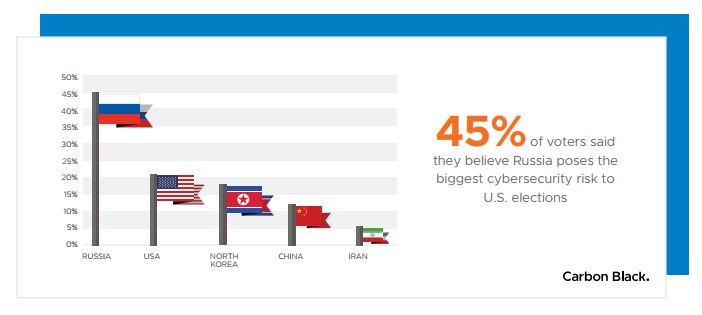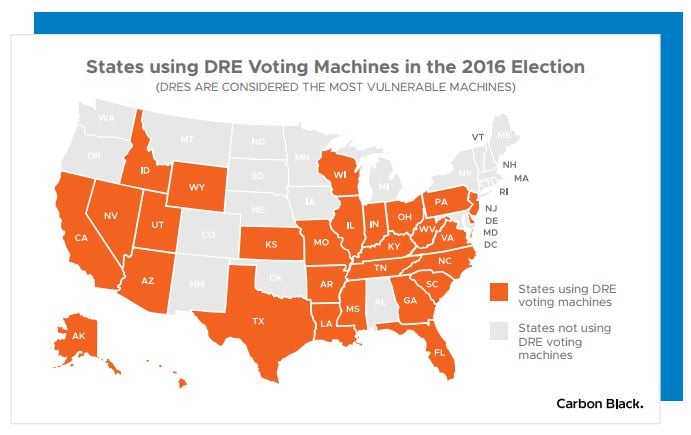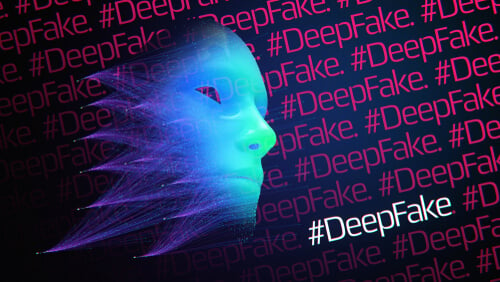A new study from Carbon Black shows a surprising number of Americans have reached their limit in voter confidence, and would consider not voting in an upcoming election.
Twenty-seven percent, to be specific, which translates to roughly 58.8 million voters. That would have a huge impact on the outcome of an election, should one in four eligible Americans chose to stay home on voting day.
As the 2018 midterm elections crawl closer, 45% of those surveyed said that they believe the elections will be influenced by cyber criminals.
And 55% don't trust their state governments to keep their personal data safe when it comes to voting registrations.
"Cyber attacks against our elections seed doubt in democracy. The idea that even a single voter is willing to forfeit their vote in fear of a cyber attack is startling. The fact that one in four voters said they would be willing to do so speaks volumes about how deeply this doubt has penetrated. The alleged cyber attacks surrounding the 2016 elections were a clarion call that foreign entities are motivated to disrupt U.S. elections," says Patrick Morely, President and CEO of Carbon Black.
He adds, "As we head to the 2018 midterms, the United States must prioritize restoring voters’ confidence. Every vote matters. If cyber attacks threaten (or even suggest) that the individual voter is powerless, the fundamental principle of our democracy is undermined."
Carbon Black's findings also show an increase in the distrust of democracy and voting security. The company conducted a similar study just prior to the 2016 election, which found one in five voters would consider not voting.
Furthermore, 47% of voters thought that the 2016 presidential election had been influenced by foreign adversaries.
While Russia has been the culprit most people have pointed to during the "discussion," the next biggest threat was the United States itself, according to voters in the study.
 Of those surveyed, 44% also think that Russia isn't stopping—and will be back during the next election season.
Of those surveyed, 44% also think that Russia isn't stopping—and will be back during the next election season.
So what can be done, if anything, to change voter perception and to ensure that systems are secure?
Changing the way votes are collected is a start. Almost a quarter of voting methods include a direct-recording electronic (DRE) machine that often use horribly outdated systems.
These are the states that used DRE machines in the 2016 election:
 Verified Voting, a non-profit that advocates for the accuracy of elections, says, "The most important aspect of a voting system, with respect to accuracy, integrity and security, is whether or not it is independently auditable. That is, the very prerequisite to accuracy, integrity and security in today’s voting technology is that there be a voter-marked paper ballot, or at least a voter-verifiable paper audit trail (VVPAT), for every vote cast. This ensures that election officials will have something they can use to confirm whether or not the electronic tallies produced by the voting system accurately reflected the intention of the voters."
Verified Voting, a non-profit that advocates for the accuracy of elections, says, "The most important aspect of a voting system, with respect to accuracy, integrity and security, is whether or not it is independently auditable. That is, the very prerequisite to accuracy, integrity and security in today’s voting technology is that there be a voter-marked paper ballot, or at least a voter-verifiable paper audit trail (VVPAT), for every vote cast. This ensures that election officials will have something they can use to confirm whether or not the electronic tallies produced by the voting system accurately reflected the intention of the voters."
As far as overcoming voters' concerns about the accuracy and importance of their vote, only time will tell as the security of the election system is addressed—for better or for worse.




